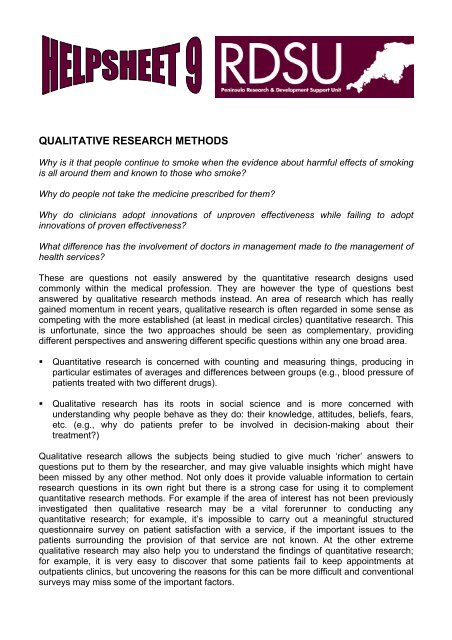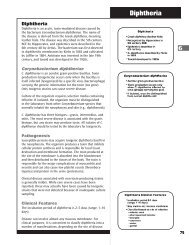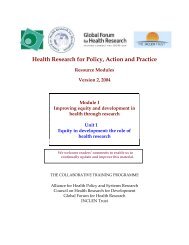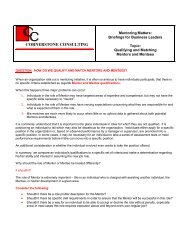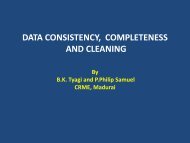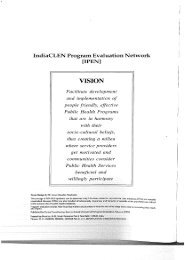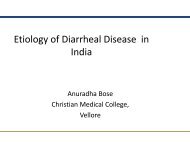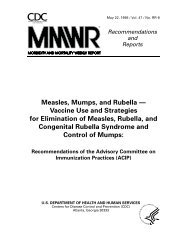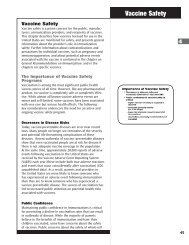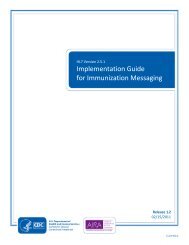QUALITATIVE RESEARCH METHODS - Chnri
QUALITATIVE RESEARCH METHODS - Chnri
QUALITATIVE RESEARCH METHODS - Chnri
Create successful ePaper yourself
Turn your PDF publications into a flip-book with our unique Google optimized e-Paper software.
<strong>QUALITATIVE</strong> <strong>RESEARCH</strong> <strong>METHODS</strong>Why is it that people continue to smoke when the evidence about harmful effects of smokingis all around them and known to those who smoke?Why do people not take the medicine prescribed for them?Why do clinicians adopt innovations of unproven effectiveness while failing to adoptinnovations of proven effectiveness?What difference has the involvement of doctors in management made to the management ofhealth services?These are questions not easily answered by the quantitative research designs usedcommonly within the medical profession. They are however the type of questions bestanswered by qualitative research methods instead. An area of research which has reallygained momentum in recent years, qualitative research is often regarded in some sense ascompeting with the more established (at least in medical circles) quantitative research. Thisis unfortunate, since the two approaches should be seen as complementary, providingdifferent perspectives and answering different specific questions within any one broad area.• Quantitative research is concerned with counting and measuring things, producing inparticular estimates of averages and differences between groups (e.g., blood pressure ofpatients treated with two different drugs).• Qualitative research has its roots in social science and is more concerned withunderstanding why people behave as they do: their knowledge, attitudes, beliefs, fears,etc. (e.g., why do patients prefer to be involved in decision-making about theirtreatment?)Qualitative research allows the subjects being studied to give much ‘richer’ answers toquestions put to them by the researcher, and may give valuable insights which might havebeen missed by any other method. Not only does it provide valuable information to certainresearch questions in its own right but there is a strong case for using it to complementquantitative research methods. For example if the area of interest has not been previouslyinvestigated then qualitative research may be a vital forerunner to conducting anyquantitative research; for example, it’s impossible to carry out a meaningful structuredquestionnaire survey on patient satisfaction with a service, if the important issues to thepatients surrounding the provision of that service are not known. At the other extremequalitative research may also help you to understand the findings of quantitative research;for example, it is very easy to discover that some patients fail to keep appointments atoutpatients clinics, but uncovering the reasons for this can be more difficult and conventionalsurveys may miss some of the important factors.
Further methods used in qualitative research studiesDiary methods - The researcher or subject keeps a personal account of daily events,feelings, discussions, interactions etc.Role-play and simulation - Participants may be asked to play a role, or may be asked toobserve role-play, after which they are asked to rate behaviour, report feelings, and predictfurther events.Case-study - This is an in-depth study of just one person, group or event. This technique issimply a description of individuals.ProblemsThe downside of qualitative research is that, invariably, only small numbers of subjects canbe studied because data collection methods are so labour intensive. It is also often criticisedfor: being subject to researcher bias; the difficulties in analysing qualitative data rigorously;the lack of reproducibility and generalisability of the findings (i.e. findings may not beapplicable to other subjects or settings). Proponents of qualitative research would howeverargue that there are strategies available to the qualitative researcher to protect against thesepotential biases and to enhance the rigour of the findings. Nicholas and Pope (1995) wrotean article in the BMJ specifically addressing techniques for improving the rigour of qualitativeresearch findings. The methodological checklist below was developed by the same authorsto help readers of qualitative projects assess the quality of published research but they alsoprovide a useful checklist for researchers to consider when designing their own qualitativeresearch.Check list for the appraisal of qualitative research– Was the research question clearly identified?– Was the setting in which the research took place clearly described?– If sampling was undertaken, were the sampling methods described?– Did the research worker address the issues of subjectivity and data collection?– Were methods to test the validity of the results of the research used?– Were any steps taken to increase the reliability of the information collected, for example,by repeating the information collection with another research worker?– Were the results of the research kept separate from the conclusions drawn by theresearch workers?– If quantitative methods were appropriate as a supplement to the qualitative methods,were they used?This helpsheet is intended only to provide an introduction to some of the key issues andtechniques involved in qualitative research. As mentioned above there are several designissues to consider when conducting this type of research and we would advise new users ofthis research to seek further information before embarking on your own work. Please contactthe R&D Support Unit on 01823 342799.ReferencesFrederikson, LG, Chamberlain, K and Long, N. (1996) Unacknowledged casualties of theVietnam war; experiences of partners of New Zealand veterans. Qualitative HealthResearch, 6(1): 49-70.
Johnson, M and Webb, C. (1995) Rediscovering unpopular patients: the concept of socialjudgement. Journal of Advanced Nursing 21 (3): 466-475Mays, N and Pope, C. (1995) Rigour and qualitative research. British Medical Journal 311:109-12Rutman, D. (1996) Caregiving as women’s work: women’s experiences of powerfulness andpowerlessness as caregivers. Qualitative Health Research 6 (1): 90-111Miles MB and Huberman AM. An Expanded Sourcebook Qualitative Data Analysis - 2ndEdition. 1994NHS Management Executive. College of Health: Consumer Audit Guidelines. 1994DirectorDr Paul Ewings, Taunton& Somerset Hospital,Musgrove Park, Taunton,Somerset TA1 5DATel: 01823 343799paul.ewings@tst.nhs.ukPeninsula RDSU (Exeter)Co-ordinatorDr Roy Powell, Noy ScottHouse, Haldon ViewTerrace, Exeter, EX2 5EQTel: 01392 403047R.J.Powell@exeter.ac.ukPeninsula RDSU(Plymouth) Co-ordinatorMr Andy Barton, RoomN17, ITTC Blg, TamarScience Park, Plymouth,PL6 8BX.Tel: 01752 315112andy.barton@phnt.swest.nhs.ukPeninsula RDSU (Truro)Co-ordinatorDr Colin Pritchard, R &Directorate Royal CornwallHospitals NHS Trust,Knowledge Spa, Truro,TR1 3HDTel: 01872 256417colin.pritchard@rcht.cornwall.nhs.uk


